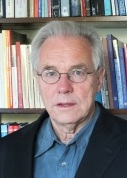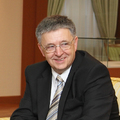World Science Forum 2011. Budapest, Day 2/6 - ICSU: “Foresight Scenarios: What will international science be like in 2031?"
17:00 - 19:00 18 November - PARALLEL THEMATIC SESSION III. ICSU: “Foresight Scenarios: What will international science be like in 2031?"
Chaired by: Yuan-Tseh Lee, President, ICSU, Carthage Smith, Deputy Executive Director, ICSU
The first Taiwanese-born Nobel laureate, receiving the chemistry award for his work on crossed molecular beams.
John Marks, Chair ICSU Taskforce on Foresight

Dr. John Marks is an independent science policy consultant and research manager. Recent assignments include the interim directorship of the Netherlands Centre for Biodiversity Naturalis and Chair of the international review panel of the research of the Royal Netherlands Meteorological Institute. He is Chair of the ICSU Taskforce on Foresight, a member of the Netherlands UNESCO Committee and a member of the Board of the Netherlands space research organisation SRON.
Until March 2009 he was deputy Chief Executive of the European Science Foundation and director of Science and Strategy. During 2007 he replaced the Chief Executive.
Dr. Marks was the director of Earth and Life Sciences at the Netherlands Organisation for Scientific Research until joining ESF in 2004. From 2000-2006 he was a member of the ICSU Committee on Strategy, Planning and Review. In this position he led the first ICSU foresight on priority research areas. From 1981 until 1998 he held various positions in Science Policy in the ministry of Education, Culture and Science. Among others he led the development of research foresight for the ministry. He was a member of the OECD Global Science Forum. He represented the Netherlands in the ESA programme board for Earth Observation and the ESA Council. During 1992-93 he was the Executive Director of the International Geosphere-Biosphere Programme.
John Marks holds a PhD in experimental physics from Leiden University, the Netherlands. A recent publication is on International research collaboration in Europe in Internationalisation of Social Sciences in Central and Eastern Europe, Routledge 2010.
World Science Forum 2011 abstract - A scenario approach for anticipating future challenges
Science plays a key role in society’s response to global ‘grand challenges’ such as resource scarcity and global environmental change. Science is also a source of new opportunities through its contributions to e.g. the transition to a sustainable society, health or agri-food. Increasingly, agenda-setting, coordination and conduct of science, and the diffusion and use of scientific knowledge, need to be framed at the global level, reflecting both the scale of the challenges and the international nature of science itself. Science is used in a comprehensive sense, including the social sciences, humanities and technology. Longer-term perspectives must be incorporated to reflect the time horizons of key global challenges.
Foresight offers a means to explore these international, long-term dimensions of science and the internal and external factors that drive its evolution. The International Council for Science (ICSU) leads the international science community in planning and implementing trans-national and interdisciplinary science programmes, and communicates science to global policy‐makers. It is applying foresight as a central component of its strategic planning in order to explore how two decades from now international collaboration in science might foster progress in science and benefit society, as well as to identify the key drivers influencing science in the next twenty years. Identifying future research priorities is not part of the exercise, since many organizations are doing this and ICSU already undertook such an exercise in 2004. In the current foresight a scenario approach is used to define four world views differing in economic, social, political, and environmental context and with different positions of science. These worlds lead to different challenges and consequences for international collaboration in science.
ICSU’s global multi-disciplinary membership composed of professional scientific societies and national academies of science, as well as its partners and stakeholders, have been engaged through consultations. The aim was to solicit viewpoints and, ultimately, buy‐in on the organization’s future direction. The collection and analysis of potential key drivers and creation of exploratory scenarios is designed also to assist ICSU Members and others in their own strategic thinking.
Using these insights, ICSU is designing a ‘success scenario’ to imagine how the international science landscape would look if it is optimally serving the needs of societies across the globe; to consider what actions ICSU and other actors would need to take to realise this; and to test the plausibility and robustness of such actions.
This presentation will describe ICSU’s foresight process and will highlight the challenges associated with conducting such exercises in international arenas. The presentation will report the results, especially the key drivers of change and the resultant exploratory scenarios. These provide important insights on a variety of organizational options for international science and the roles science could play in addressing future global grand challenges.
Francoise Caillods - Senior Managing Editor, World Social Science Report International Social Science Council
Senior Managing Director
World Social Science Report (ISSC)
Françoise CAILLODS joined the ISSC in September 2008 as Senior Managing Editor of the WSSR. She coordinated the preparation of the 2010 World Social Science Report on Knowledge Divides, which was published by UNESCO and ISSC in June 2010. Françoise Caillods holds a MA in Economics from the Faculté de Droit et Sciences Economiques, Paris (France) and an MA in Economics, Columbia University, New York (USA). She has been Deputy Director of the UNESCO International Institute for Education Planning (IIEP) in Paris which she joined in 1969. She has conducted and directed several research projects on Education Policy and Planning: Quality Education for All, Microplanning and school mapping, Secondary education financing and reforms, Education and poverty reduction, Planning education in a world with AIDS, New forms of international cooperation and funding . She has published numerous books and articles in these areas. She is also general editor of the flagship series of IIEP/UNESCO on the Fundamentals for Educational planning. She has also participated in several missions evaluating different Education Programmes and advising countries in the above mentioned areas.
World Science Forum 2011 abstract - The World Social Science Report: directions for future action in the social sciences
In 2010, UNESCO published the second World Social Science Report, which had been prepared by the International Social Science Council (ISSC). The 2010 Report presents an overview of the state of social sciences research in the different parts of the world. Today’s fast-changing global reality presents new challenges to social sciences, and the Report addresses their capacity to respond to them. In the past fifteen years, social science has expanded fast and become globalized. Social sciences are now produced and taught almost everywhere in the world. Yet their production, their reach and their use are still marked by disparities and fragmentation. The Report analyses these divides and the extent to which they undermine the ability to address challenges which have themselves become global. It takes stock of worldwide developments in social science over the first decade of the twenty-first century. The presentation will outline the main findings of the Report.
Nebojsa Nakicenovic, Director, Global Energy Assessment
Director, Global Energy Assessment
Nebojsa Nakicenovic is Deputy Director of the International Institute for Applied Systems Analysis (IIASA), Professor of Energy Economics at the Vienna University of Technology, and Director of the Global Energy Assessment (GEA).
Among other positions, Prof. Nakicenovic is member of the United Nations Secretary General Advisory Group on Energy and Climate Change; Member of the Advisory Council of the German Government on Global Change (WBGU); Member of the Advisory Board of the World Bank Development Report 2010: Climate Change; Member of the International Council for Science (ICSU) Committee on Scientific Planning and Review, and Member of the Global Carbon Project; Member of the Energy Sector Management Assistance Program (ESMAP) Expert Panel on Sustainable Energy Supply, Poverty Reduction and Climate Change; Member of the Panel on Socioeconomic Scenarios for Climate Change Impact and Response Assessments; Lead Author of Fifth Assessment Report of the IPCC; Member of the Renewable Energy Policy Network for the 21st Century (REN21) Steering Committee; Member of the International Advisory Board of the Helmholtz Programme on Technology, and Chair of the Advisory Board of OMV Future Energy Fund (Austrian oil company).
He is also Editorial Board Member of the following journals: International Journal of Technological Forecasting and Social Change, International Journal on Climate Policy, the International Journal of the Institution of Civil Engineers, Current Opinion in Environmental Sustainability, the International Journal of Energy Sector Management, and the Journal of Energy Strategy Reviews.
Prof. Nakicenovic was a Coordinating Lead Author of the Intergovernmental Panel on Climate Change (IPCC), the Fourth Assessment Report, 2002 to 2007, Coordinating Lead Author of the Millennium Ecosystem Assessment, 2001–2005, Director, Global Energy Perspectives, World Energy Council, 1993 to 1998, Convening Lead Author of the Second Assessment Report of the Intergovernmental Panel on Climate Change, 1993 to 1995, Convening Lead Author of the IPCC Special Report on Emissions Scenarios, 1997 to 2000, Lead Author of Third Assessment Report of the IPCC, 1999 to 2001, Convening Lead Author of the World Energy Assessment: Energy and the Challenge of Sustainability, 1999 to 2000, Member of the International Science Panel on Renewable Energies (ISPRE), 2006 to 2008, and Guest Professor at the Technical University of Graz, 1993–2003.
Prof. Nakicenovic holds bachelors and masters degrees in economics and computer science from Princeton University, New Jersey, USA and the University of Vienna, where he also completed his Ph.D. He also holds Honoris Causa PhD degree in engineering from the Russian Academy of Sciences.
Among Prof. Nakicenovic's research interests are the long-term patterns of technological change, economic development and response to climate change and, in particular, the evolution of energy, mobility, and information and communication technologies.
World Science Forum 2011 abstract - World in Transition – A Social Contract for Sustainability: Global Energy Transformations
Humankind has become a dominant factor of the Earth System. Indeed, the notion of the Anthropocene (‘The Age of Man’) was proposed to denote the human interference with the planetary processes. We are rapidly approaching dangerous interference with trends such as climate change and the destruction of biological diversity that jeopardize our natural life support systems. Nonetheless, there are also some positive developments, such as the shift in values towards greater environmental awareness which can be observed worldwide, as well as democratization and a modest decrease in poverty. A major, game-changing, grand transformation towards sustainable futures is both necessary and feasible. A key element of a “social contract” for transformative change toward a low-carbon and sustainable global economic system is the ‘proactive democracy with greatly extended participation by citizens.
By significant investment in new technologies and decarbonization as well as more sustainable lifestyles, multiple co-benefits can be achieved – from provision of affordable and clean energy services to creation of new business opportunities and mitigation of dangerous climate change. In the energy area, this implies a shift from traditional energy sources, in the case of those who are excluded from access today, to clean fossils and modern renewable energy, and in the more developed parts of the world, a shift from fossil energy sources to carbon-free and carbon neutral energy services. Thus, the emergence of new energy systems and infrastructures require two complementary co-evolutions – one is technological and the other institutional. The third one may be behavioral. With new technologies and systems, new business models and institutional arrangements will emerge. All of these complementary and co-evolving transformations will require market, regulatory and behavioral changes.
The cumulative nature of technological, institutional and behavioral change, all compounded by deep uncertainties, require innovations to be adopted as early as possible in order to lead through experimentation and evolutionary changes to lower costs and wider diffusion of niew systems in the following decades. The longer we wait to introduce these advanced technologies, the higher the required costs and emissions reduction will be as well as the “lock-in” into the old structures. The transformational change toward more sustainable futures requires enhanced research, development and deployment (public and private) efforts as well as early investments to achieve accelerated diffusion and adoption of advanced low-carbon technologies and systems.
The ever more evident crisis of the “old” development patterns is an opportunity for the “new” ones to emerge.
Alice Rangel de Paiva Abreau - Director, Regional Office for Latin America and the Caribbean, International Council for Science (ICSU); Coordinator, GAB National Committee in Brazil
Alice Rangel de Paiva Abreu, from Brazil, is Professor Emerita of the Federal University of Rio de Janeiro. She received her doctoral degree in Sociology from the University of São Paulo Brazil (1980), and her M.Sc. in Sociology from the London School of Economics and Political Science of the University of London (1971). Full Professor of Sociology from the Federal University of Rio de Janeiro until 2005, Professor Abreu is a former Vice President of the Brazilian National Research Council for Scientific and Technological Development and Director of the Office of Education, Science and Technology of the Organization of American States. Professor Abreu received the National Order of Scientific Merit from the Ministry of Science and Technology of Brazil in 2001, and was awarded with the "Palmes Académiques" from the Ministry of Youth, National Education and Research of France in 2003. At present Professor Abreu is a Member of the Board of the Gender Advisory Board of the UN Commission for Science and Technology for Development - UNCSTD and an Associate Member of TWOWS - Third World Organization for Women in Science.
Recommended link: ICSU in Latin America
Attila Havas, Senior Research Fellow, Hungarian Academy of Sciences 
Attila Havas, PhD is a Senior Research Fellow at the Institute of Economics, Hungarian Academy of Sciences, and regional editor of International Journal of Foresight and Innovation Policy. His academic interests are in economics of innovation, national and sectoral innovation systems, theory and practice of innovation policy, the inter-relationships between STI and other policies, and (technology) foresight as a policy tool. He holds a PhD in economics (The Diffusion of New Technologies) from the Hungarian Academy of Sciences, 1997.
He has participated in a number of international research projects on STI policies, innovation and transition, as well as on foresight and prospective analyses, advised foresight programmes in several countries, has been a member of EU expert groups, and invited speaker at a number of international conferences and workshops on technology foresight.
In 1997-2000 he was Programme Director of TEP, the Hungarian Technology Foresight Programme. Previously he had worked for IKU, Innovation Research Centre, Budapest University of Economics (1990-97) and for other institutes in the field of industrial economics and industrial policy (1983-89).
Havas Attila 2001. januártól a Közgazdaságtudományi Intézet tudományos főmunkatársa. Kutatási területe az innováció gazdaságtana: az ágazati és nemzeti innovációs rendszerek működése; a tudomány-, technológia- és innovációpolitika eszközei, ezen belül kiemelten az előretekintés elmélete és gyakorlata; a TTI-politika és a szakpolitikák összekapcsolása. Ezeken a területeken számos nemzetközi kutatási programban vett részt, illetve nemzetközi konferenciákon rendszeresen felkérik előadások tartására. A cseh, görög, litván, török és szlovén technológiai előretekintési programok tanácsadója, valamint EU szakértői csoportok tagja volt. Az International Journal of Foresight and Innovation Policy szerkesztő bizottságának tagja. 1997-2000-ben az első magyar Technológiai előretekintési Programot vezette, korábban pedig az IKU, Innovációs Kutatóközpont (1990-97) és más ipargazdasági kutatóintézetek munkatársa volt (1983-89).
Michael Keenan, Country Studies and Outlook Division, Directorate for Science, Technology and Industry, OECD

Michael Keenan (BSc. MA PhD) is an analyst in the OECD’s Directorate for Science, Technology and Industry. He has worked in the innovation policy field for more than fifteen years, most of which was spent at the Manchester Institute of Innovation Research, where he maintains an honorary position. During his time at Manchester, Michael worked mostly on technology foresight, publishing books and papers, teaching graduate and executive training courses, and consulting governments and international organisations on their foresight activities. He is on the editorial boards of several international journals and has participated as a member of various international advisory groups. His current work centres on national innovation policies and he presently works on the OECD’s country reviews of innovation policy. Over the last few years, he has participated in reviews of Korea, Mexico, Hungary, Greece, Russia, Sweden and SE Asia. He also leads the OECD’s work on the development of its Innovation Policy Platform, a flagship project to establish a web-based knowledge management tool in support of innovation policy-making.
Video: About Organisation for Economic Co-operation and Development - OECD





